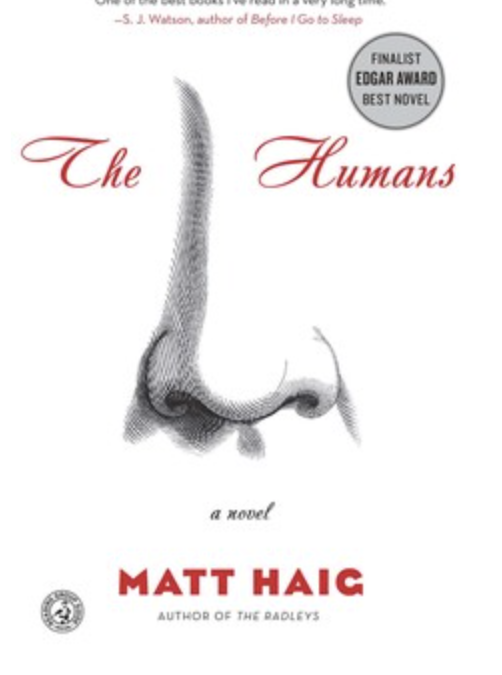At the end of last year, I read The Humans by Matt Haig, and it still haunts me. Not in an ominous way, but more like the dictionary definition of haunt, “to remain with.” This novel won’t let me go, won’t let me ignore it. The book’s message is even more haunting right now, during this coronavirus outbreak, as it portrays what is best in the human race and reminds us to savor the humanity in ourselves and in others.
For those who do not like science fiction (and I’m not a big fan myself), do not shy away when I tell you that the main character (and narrator) of The Humans is an alien sent to earth on a perverted mission to save us from ourselves. He assumes the role of a mathematician whose work is deemed by superior beings to be a threat to the universe. The alien’s evolution from the perception that we are violent, incapable beings to an understanding of what it means to be human is enlightening—to the alien, and to the readers of this book.
Since the alien is not one of us, he sees our less favorable qualities easily, and points them out. “I have to admit that humans waste a lot of their time—almost all of it—with hypothetical stuff. I could be rich. I could be famous. I could have been hit by that bus. I could have been born with fewer moles and bigger breasts. I could have spent more of my youth learning foreign languages. They must exercise the conditional tense more than any other known life-form.”
The alien views our world with the innocence of a small child and reminds us to pay closer attention. One of my favorite moments in the book is the alien’s description of a piece of music I particularly love, but have not given close attention in some time: “The last thing I listened to was a tune called ‘Clair de Lune’ by Debussy. That was the closest representation of space I had ever heard, and I stood there in the middle of the room, frozen with shock that a human could have made such a beautiful noise.”
After reading the book I listened to “Clair de Lune” with new ears and remembered my toddler son stooping to pick miniscule blue flowers by the sidewalk. Flowers I would not have seen at all, had he not pointed them out. The Humans is like that. It reminds us to wonder at what we see around us.
It is not a new book; it was originally published in 2013. In the midst of a wonderfully clever story, we find a guide for living. Things seem hopeful even when they are falling apart. It is an ideal book for the coronavirus times when we are isolated and perhaps more introspective than usual.
As the alien comes to see our nobler traits, I especially resonated with his description of love in older years. I believe he nails it on the head when he describes “a total, prime-of-life love. . .The kind that could only be possible in someone who was going to die at some point in the future, and also someone who had lived enough to know that loving and being loved back was a hard thing to get right, but when you managed it, you could see forever.”
In these moments of trial, in our isolation, we need that love and an understanding of each other more than ever. I found that in The Humans and am grateful to Matt Haig for the enlightening my life more than most books I have read.
The alien has no need for reading as his species carries all knowledge in their heads. “No wonder they were a species of primitives,” the alien says. “By the time they have read enough books to actually reach a state of knowledge where they can do anything with it, they are dead.” The Humans lead to that state of knowledge. The only problem with the book is that, like a good chocolate bar, it doesn’t last very long, as it’s incredibly hard to put down.


I love this book so much, but am incoherent when I try to explain the reasons why to others. You’ve expressed so well what I feel about it. And you’ve picked some of my favorite passages to illustrate the reasons. Thank you!
You should be a professional book reviewer. Much better than any review that I have read in the NY Times! I have added this book to my “must read” list. It’s getting longer & longer but this is at the top of the list now. Thank you for making me aware of a book that I would probably not have found on my own.